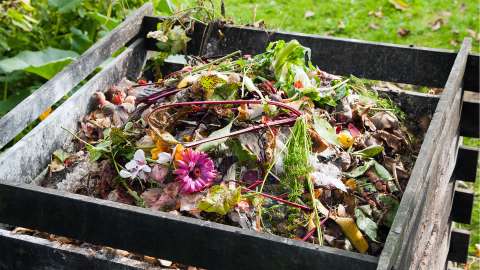Jump To:
Why Compost?
Raleigh residents can help reduce the costs of operating the City of Raleigh's Yard Waste Center by recycling their own yard waste. Grass clippings, leaves, tree limbs, and shrubbery trimmings can be a valuable source of nutrition for your yard instead of piling up at the Yard Waste Center.
You can save money by recycling and composting this material instead of purchasing soil amendments.
Compost Piles
Composting leaves and grass clippings causes the material to break down into a soil enhancer called humus, which helps produce healthier plants. Making compost is as easy as adding three key ingredients - carbon, nitrogen, and soil.
Remember that the smaller the particles in the compost pile, the faster fungi, microorganisms, bacteria, worms, beetles and centipedes will break down the material into rich compost.
Composting With Worms
Vermicomposting is easy and fun.
You can compost indoors or outside with your food scraps and a few worms!
The worms will eat your "garbage" and leave you with a super-rich compost to use inside with your house plants or outside in your garden.
Why should I vermicompost?
To reduce your household garbage. Food scraps make up eight to 11 percent of the waste stream. That is about 6,000 tons from Raleigh households.
To produce a high quality garden compost. The product of vermicomposting, worm castings, is a rich soil amendment sold in stores for as much as $4 a bag.
Grass Recycling
Grass recycling is one of the easiest ways to improve the appearance of your yard without spending hundreds of dollars on soil nutrient products and fertilizer. Just leave your grass clippings on your lawn after mowing, and they will decompose naturally, releasing valuable nutrients, such as nitrogen, phosphorus and potassium into the soil. A layer of grass clippings also helps reduce water evaporation, cutting down on the number of times you have to water your lawn, and can help your lawn stay healthy and weed-free by keeping the soil cool.
Leaving grass clippings on the lawn will not contribute to thatch build-up as grass clippings are composed mostly of water and beneficial nutrients while thatch comes primarily from roots and stems.
Tips for Grass Recycling
- Mow when grass is dry and make sure your mower blade is sharp. A sharp blade and dry grass mean that the clippings will be cut into finer pieces and will decompose faster.
- Don't let grass get too long before mowing, and never cut grass too short.
- For a stronger, healthier and more drought-resistant lawn, never remove more than the top two-thirds of blade growth.
- If you wait until your grass is high before mowing, it is best to bag the clippings for mulching and composting.
Mulching
Chipping or shredding tree limbs and shrubbery trimmings makes an excellent mulch for use as a decorative border for paths, in planting beds or around trees and shrubs.
Shredded leaves and pine straw also make a good mulch for flower beds, gardens, trees and shrubbery. Leaf and pine straw mulch acts as a natural fertilizer while reducing water evaporation, helping to control weeds and preventing soil erosion. Using materials you normally would throw away also saves money on commercial mulch products.
Did you know?
Approximately 30 to 50 percent of our waste stream is organic.
Remember, you can save money on mulch and fertilizer while reducing your contribution to the solid waste problem by composting at home.



